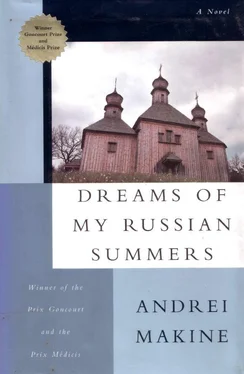In the streets of Saranza, at nightfall, she added this emotional epilogue to her story: "Your grandfather," she said softly, "never referred to that business. Never… And he loved your uncle Sergei as if he were his own son. Even more, perhaps. It's hard for a man to accept that his first child is the result of a rape. Especially as Sergei, you know, doesn't look like anyone else in the family. No, he never spoke about it…"
I sensed her voice shaking slightly. "She loved Fyodor," I thought quite simply. "It was he who made it possible for this country, where she has suffered so much, to be her own. And she still loves him. After all these years without him. She loves him out here on the steppes at night, in this Russian immensity. She loves him…"
Love appeared to me anew in all its sorrowful simplicity. Inexplicable. Inexpressible. Like that constellation reflected in the eye of a wounded animal in the middle of a desert covered in ice.
It was a chance slip of the tongue that revealed an unsettling reality to me: the way I was speaking French was no longer the same…
In asking Charlotte a question that day, I got my words twisted. I must have come up against one of those pairs of words, a deceptive pair, of which there are many in French. Yes, it was couples along the lines of "mitigate-militate" or "prefabricate-prevaricate." In the old days my verbal clumsiness with such perfidious duos, some as fraught with risk as "luxe-luxure" ("luxury-lewdness"), used to provoke mockery from my sister and discreet corrections from Charlotte.
This time I did not need prompting with the appropriate word. After a second of hesitation I corrected myself. But much more shocking than this momentary hesitation was a devastating revelation: I was speaking a foreign language!
So the months of my rebellion had left their mark. It was not that henceforth I found it hard to express myself in French. But the break was there. As a child I had absorbed all the sounds of Charlotte's language. I swam in them, without wondering why that glint in the grass, that colored, scented, living brilliance, sometimes existed in the masculine and had a crunchy, fragile, crystalline identity, imposed, it seemed, by one of its names, tsvetok ; and was sometimes enveloped in a velvety, feltlike, and feminine aura, becoming une fleur.
I was later reminded of the story of the millipede that, when questioned about its dancing technique, immediately muddled the – normally instinctive – movements of its innumerable limbs.
My case was not quite as desperate. But from the day of my slip, the question of technique became unavoidable. Now French became a tool whose capacity I measured as I was speaking. Yes. An instrument independent of me, which I would employ, even as I became aware from time to time of the strangeness of this activity.
My discovery, disconcerting though it was, gave me a penetrating insight into style. This language-tool, employed, sharpened, perfected, was, I told myself, nothing other than literary composition. I had already sensed that the anecdotes about France with which I had amused my fellow pupils throughout that year were the first draft for this novelist's language: had I not manipulated it to please sometimes the "proletarians" and sometimes the "aesthetes"? Literature was now revealed as being perpetual amazement at the flow of words into which the world dissolved. French, my grandmaternal tongue, was, I saw now, the supreme language of amazement.
Ever since that particular day in the distant past, spent beside a little river, lost in the midst of the steppe, occasionally when I am in midconversation in French I recall my surprise of long ago: a gray-haired lady with great calm eyes and her grandson are seated at the heart of the empty plain, beneath the burning sun, very Russian in the endlessness of its isolation, and they are speaking in French, the most natural thing in the world… I see this scene again and I am amazed to be speaking French. Then I stumble and feel as if the cat had got my French. Strangely, or rather quite logically, it is at moments like this, when I find myself between two languages, that I believe I can see and feel more intensely than ever.
Perhaps it was on that same day, when I said précepteur (tutor) instead of percepteur (tax collector) and thus entered a silent zone between two languages, that I also noticed Charlotte's beauty…
The idea of this beauty at first seemed to me improbable. In Russia at that time every woman reaching the age of fifty was transformed into a "babushka" – a being in whom it would have been absurd to look for femininity, let alone beauty. And as for stating, "My grandmother is beautiful"…
Yet Charlotte, who must have been sixty-four or sixty-five at the time, was beautiful. Settling down at the bottom of the steep, sandy bank of the Sumra, she read beneath the branches of the willows that covered her dress with a network of shadow and sunlight. Her silver hair was gathered at the nape of her neck. Her eyes looked at me from time to time with a faint smile. I tried to understand what it was in this face, in this very simple dress, that radiated the beauty whose existence I was almost embarrassed to recognize.
No. Charlotte was not "a woman who does not look her age." Nor did her features have that haggard prettiness seen in the "well-cared-for" faces of women who wage unending war on wrinkles. She did not seek to camouflage her age, but her aging did not provoke the shrinking that emaciates the features and withers the body. I took in with my eyes the silvery gleam of her hair, the lines of her face, her arms lightly tanned, her bare feet almost touching the lazy rippling of the Sumra… And with an unwonted joy I observed that there was no strict boundary between the flowered fabric of her dress and the shadows dappled with sunlight. The contours of her body merged imperceptibly into the luminosity of the air; her eyes, in the manner of a watercolor, mingled with the warm brilliance of the sky; the movements of her fingers turning the pages wove themselves into the undulation of the long willow branches… So it was this fusion that hid the mystery of her beauty!
Yes, her face and her body were not tensed, fearful of the arrival of old age; they absorbed sun and wind; the bitter scents of the steppe; the freshness of the willow groves. And her presence conferred an astonishing harmony on this desert space. Charlotte was there, and in the monotony of the plain scorched by the heat, an elusive consonance was formed: the melodious gurgling of the stream, the tart smell of the wet clay and the aromatic one of the dry plants; the play of shadow and light beneath the branches. A unique moment, inimitable in the blurred sequence of days, of years, of ages…
A moment that did not pass away.
I was discovering Charlotte's beauty. And almost at the same moment her isolation.
That day, lying on the shore, I was listening to her talking about the book she took on our excursions. Ever since my slip of the tongue, I could not prevent myself taking note, while keeping up with the conversation, of the way in which my grandmother employed French. I compared her style with that of the authors I was reading and with that of the rare French newspapers that got through into our country. I knew all the distinctive features of her French, her favorite expressions, her personal syntax, her vocabulary, and even the patina of time that her sentences bore – the belle époque flavor…
On this occasion, more than all these linguistic observations, a surprising thought came into my mind: "For half a century this style has lived in complete isolation, very rarely spoken, grappling with a reality foreign to its nature, like a plant striving to grow on a bare rock face…" And yet Charlotte's French had retained an extraordinary vigor, rich and pure, that amber transparency that wine acquires with aging. This style had survived Siberian snowstorms, the burning sands in the desert of central Asia. And it resonates still on the banks of this river in the midst of the endless steppe…
Читать дальше












